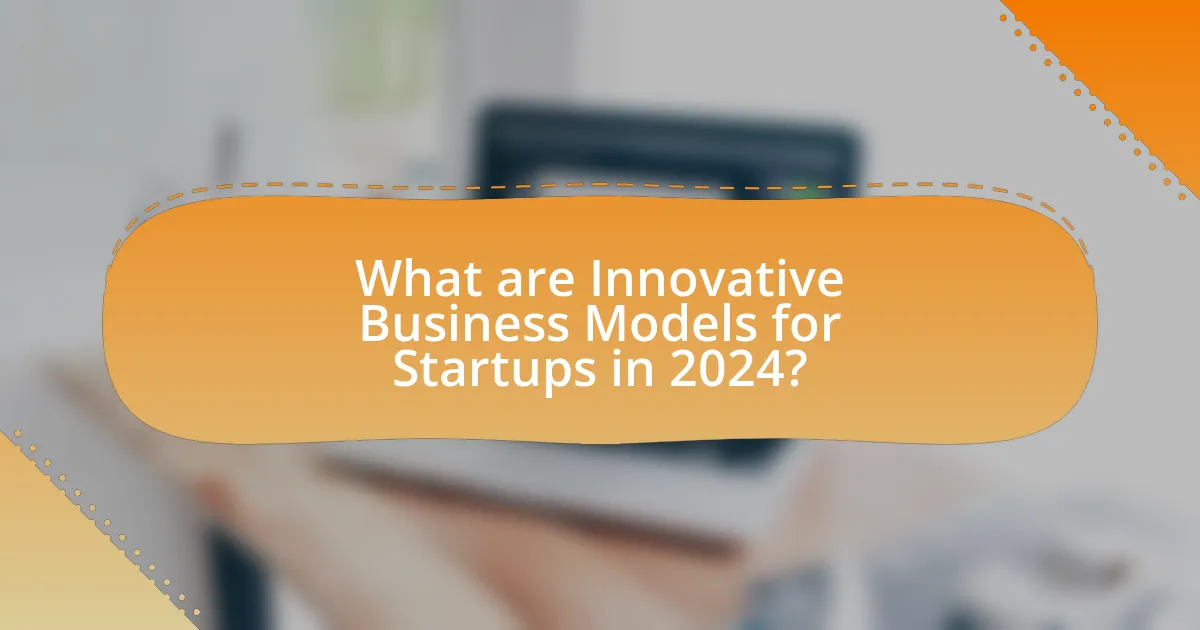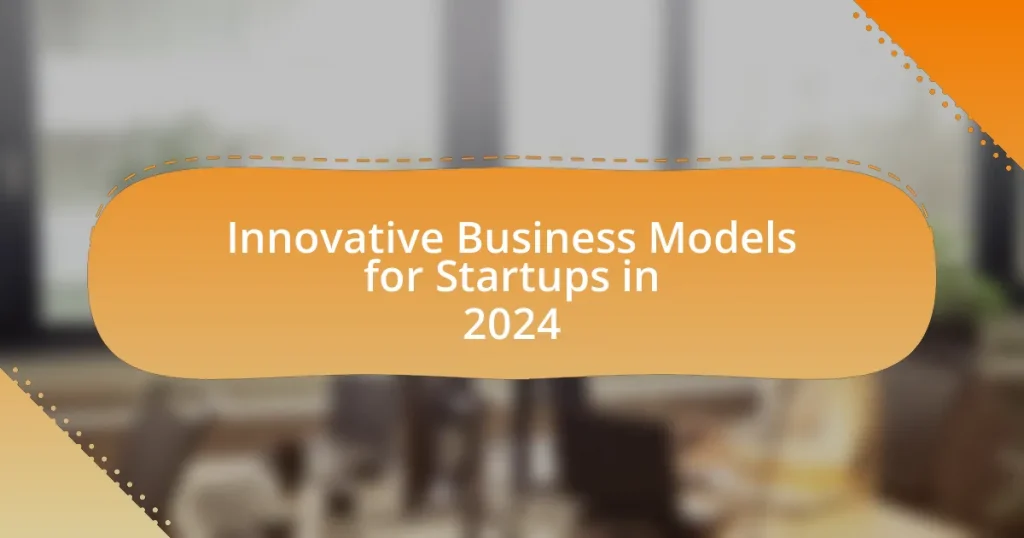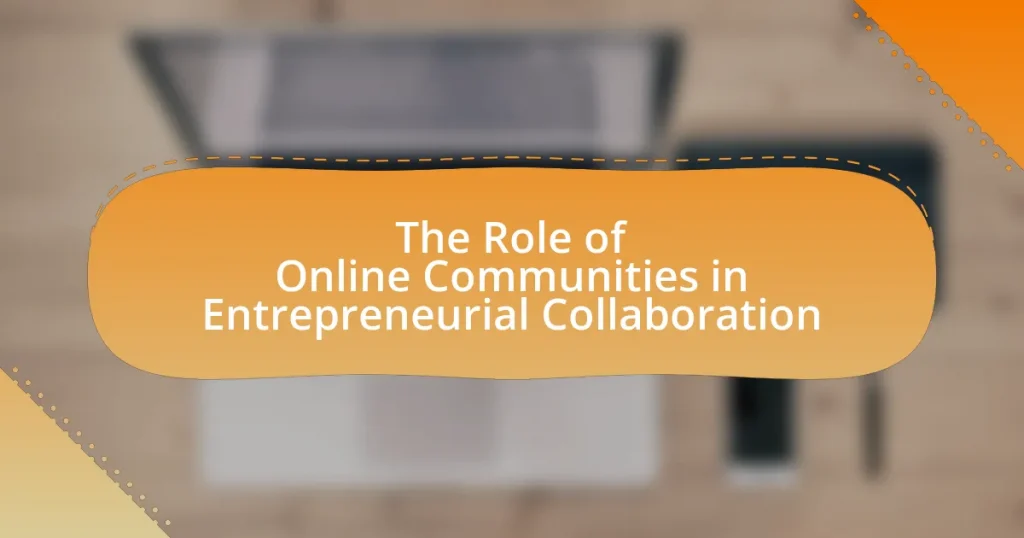The article focuses on innovative business models for startups in 2024, highlighting key approaches such as subscription-based services, platform ecosystems, and circular economy models. It examines how these models differ from traditional practices by emphasizing technology, scalability, and customer engagement. The discussion includes the importance of innovation for startups, trends shaping business models, and the role of consumer behavior in their development. Additionally, it addresses challenges startups face in adopting these models and offers strategies for overcoming financial constraints and mitigating market risks. Successful examples and best practices for implementing innovative business models are also outlined, providing a comprehensive overview of the current landscape for startups.

What are Innovative Business Models for Startups in 2024?
Innovative business models for startups in 2024 include subscription-based services, platform ecosystems, and circular economy models. Subscription-based services allow startups to generate recurring revenue by offering products or services on a subscription basis, which has been validated by the success of companies like Netflix and Dollar Shave Club. Platform ecosystems enable startups to connect users and providers, creating value through network effects, as seen in companies like Airbnb and Uber. Circular economy models focus on sustainability by designing products for reuse and recycling, which aligns with growing consumer demand for environmentally responsible practices, evidenced by the rise of brands like Patagonia. These models reflect current market trends and consumer preferences, making them viable options for startups in 2024.
How do these business models differ from traditional models?
Innovative business models differ from traditional models primarily in their approach to value creation and delivery. Traditional models often rely on established practices such as product sales and direct customer interactions, whereas innovative models leverage technology, data analytics, and customer engagement strategies to create value. For instance, subscription-based models, prevalent among startups, provide continuous revenue streams and foster customer loyalty, contrasting with the one-time sales focus of traditional models. Additionally, innovative models often emphasize scalability and adaptability, allowing businesses to pivot quickly in response to market changes, a flexibility that traditional models typically lack. This shift is supported by the rise of digital platforms, which enable startups to reach global markets efficiently, further distinguishing them from conventional business practices.
What key characteristics define innovative business models?
Innovative business models are defined by their ability to create unique value propositions, leverage technology, and adapt to changing market conditions. These models often incorporate elements such as customer-centric approaches, scalability, and sustainability. For instance, companies like Airbnb and Uber have disrupted traditional industries by utilizing technology to connect service providers directly with consumers, demonstrating the effectiveness of innovative business models in creating new markets and enhancing user experiences. Additionally, research indicates that businesses employing innovative models can achieve higher growth rates, as evidenced by a study from McKinsey, which found that companies with innovative business models outperformed their peers by 30% in revenue growth over five years.
Why is innovation crucial for startups in 2024?
Innovation is crucial for startups in 2024 because it enables them to differentiate themselves in a highly competitive market. Startups face rapid technological advancements and shifting consumer preferences, making it essential to develop unique products or services that meet emerging demands. According to a report by McKinsey, 84% of executives believe that innovation is critical for their growth strategy, highlighting its importance in driving market relevance and customer engagement. Furthermore, startups that prioritize innovation are more likely to attract investment, as investors seek companies that demonstrate potential for scalability and adaptability in changing environments.
What trends are shaping innovative business models in 2024?
In 2024, key trends shaping innovative business models include the rise of subscription-based services, increased emphasis on sustainability, and the integration of artificial intelligence. Subscription-based models are gaining traction as they provide predictable revenue streams and foster customer loyalty; for instance, companies like Netflix and Spotify have successfully leveraged this approach. Sustainability is becoming a core component of business strategies, with consumers increasingly favoring brands that prioritize eco-friendly practices, as evidenced by a 2023 survey indicating that 70% of consumers are willing to pay more for sustainable products. Additionally, the integration of artificial intelligence is transforming operations and customer interactions, with businesses utilizing AI for personalized marketing and enhanced decision-making, reflecting a broader trend towards digital transformation in the marketplace.
How is technology influencing new business models?
Technology is significantly influencing new business models by enabling greater efficiency, scalability, and customer engagement. For instance, cloud computing allows startups to reduce infrastructure costs and scale operations rapidly, while data analytics provides insights into consumer behavior, facilitating personalized marketing strategies. According to a report by McKinsey, companies that leverage advanced analytics can improve their profitability by 8-10%. Additionally, the rise of e-commerce platforms has transformed traditional retail models, allowing businesses to reach global markets with lower overhead costs. These technological advancements are reshaping how startups operate, compete, and deliver value to customers.
What role does consumer behavior play in shaping these models?
Consumer behavior significantly influences the development of innovative business models for startups in 2024. By analyzing purchasing patterns, preferences, and feedback, startups can tailor their offerings to meet the specific needs and desires of their target audience. For instance, research from the Harvard Business Review indicates that companies that effectively leverage consumer insights can increase their market share by up to 20%. This data underscores the importance of understanding consumer behavior as it directly impacts product design, marketing strategies, and overall business viability.
What challenges do startups face when adopting innovative business models?
Startups face several challenges when adopting innovative business models, including market uncertainty, resource constraints, and resistance to change. Market uncertainty arises from the unpredictable nature of consumer behavior and competition, making it difficult for startups to validate their business models. Resource constraints, such as limited funding and human capital, hinder the ability to experiment and pivot as needed. Additionally, resistance to change can occur within the organization or from external stakeholders, complicating the implementation of new models. According to a 2022 report by the Global Entrepreneurship Monitor, 70% of startups cite market uncertainty as a significant barrier to innovation, highlighting the prevalence of these challenges.
How can startups overcome financial constraints?
Startups can overcome financial constraints by leveraging alternative funding sources such as crowdfunding, angel investors, and venture capital. These funding avenues provide necessary capital without the immediate repayment obligations associated with traditional loans. For instance, according to a report by the Crowdfunding Industry Report, crowdfunding platforms raised over $17 billion in 2020, demonstrating a significant trend towards this funding model. Additionally, startups can implement lean business practices to minimize expenses, focusing on essential operations and utilizing technology to automate processes. This approach not only conserves cash flow but also enhances operational efficiency, allowing startups to allocate resources more effectively.
What strategies can be employed to mitigate market risks?
To mitigate market risks, startups can employ diversification, hedging, and robust market research strategies. Diversification involves spreading investments across various sectors or products to reduce exposure to any single market fluctuation. For instance, a startup that offers multiple product lines can cushion the impact of a downturn in one area by relying on others. Hedging, such as using financial instruments like options or futures, allows businesses to protect against price volatility in their key inputs or outputs. Additionally, conducting thorough market research enables startups to understand consumer trends and competitive dynamics, allowing them to adapt their strategies proactively. According to a study by McKinsey & Company, companies that engage in regular market analysis are 30% more likely to identify and respond to market risks effectively.
How can startups effectively implement innovative business models?
Startups can effectively implement innovative business models by leveraging agile methodologies, customer feedback, and technology integration. Agile methodologies allow startups to quickly adapt their business models based on market demands and customer insights, fostering a culture of continuous improvement. For instance, a study by the Harvard Business Review found that companies using agile practices can respond to changes 25% faster than their competitors. Additionally, incorporating customer feedback into the development process ensures that the business model aligns with consumer needs, which is crucial for market fit. Technology integration, such as utilizing data analytics and automation, enhances operational efficiency and scalability, enabling startups to innovate rapidly. These strategies collectively empower startups to create and sustain innovative business models in a competitive landscape.
What are the key components of a successful innovative business model?
The key components of a successful innovative business model include value proposition, customer segmentation, revenue streams, cost structure, and key partnerships. A strong value proposition clearly defines how a product or service meets customer needs, differentiating it from competitors. Customer segmentation identifies specific groups of consumers to target, ensuring tailored marketing strategies. Revenue streams outline how the business generates income, which can include sales, subscriptions, or licensing. The cost structure details the expenses involved in operating the business, allowing for effective budgeting and financial planning. Key partnerships involve collaborations that enhance the business’s capabilities, such as suppliers, distributors, or technology partners. These components collectively contribute to the sustainability and growth of innovative business models, as evidenced by successful startups that have effectively integrated them, such as Airbnb and Uber, which transformed their respective industries by leveraging these elements.
How do value propositions differ in innovative models?
Value propositions in innovative models differ primarily in their focus on unique customer needs and disruptive solutions. Unlike traditional models that often emphasize cost or efficiency, innovative models prioritize creating new value through differentiation, personalization, and enhanced customer experiences. For instance, companies like Airbnb and Uber have transformed their respective industries by offering unique value propositions that leverage technology to meet consumer demands for convenience and flexibility, demonstrating that innovative models can redefine market expectations and customer engagement.
What operational strategies support innovative business models?
Operational strategies that support innovative business models include agile project management, lean startup methodologies, and data-driven decision-making. Agile project management allows startups to adapt quickly to market changes, facilitating rapid iteration and innovation. Lean startup methodologies emphasize validated learning through customer feedback, reducing waste and enhancing product-market fit. Data-driven decision-making leverages analytics to inform strategic choices, ensuring that innovations align with customer needs and market trends. These strategies collectively enhance a startup’s ability to innovate and respond effectively to dynamic environments.
What are some examples of successful innovative business models in 2024?
In 2024, successful innovative business models include subscription-based services, platform ecosystems, and circular economy models. Subscription-based services, exemplified by companies like Netflix and Spotify, generate consistent revenue by offering users access to content or products for a recurring fee. Platform ecosystems, such as those created by Amazon and Airbnb, leverage network effects to connect buyers and sellers, enhancing user engagement and market reach. Circular economy models, demonstrated by brands like Patagonia, focus on sustainability by promoting recycling and reusing products, thereby reducing waste and appealing to environmentally conscious consumers. These models have proven effective in adapting to changing consumer preferences and market dynamics.
How have companies adapted their models to meet current market demands?
Companies have adapted their models to meet current market demands by embracing digital transformation and enhancing customer-centric approaches. For instance, many organizations have shifted to e-commerce platforms, allowing them to reach a broader audience and respond to changing consumer behaviors, particularly during the COVID-19 pandemic. According to a McKinsey report, businesses that rapidly digitized their operations saw a 20-25% increase in customer engagement. Additionally, companies have implemented subscription-based models, which provide steady revenue streams and foster customer loyalty, as evidenced by the success of firms like Adobe and Netflix. These adaptations demonstrate a strategic alignment with evolving market needs and consumer preferences.
What lessons can be learned from these successful startups?
Successful startups demonstrate the importance of adaptability and customer-centric innovation. These companies often pivot their business models in response to market feedback, ensuring they meet evolving consumer needs. For instance, companies like Airbnb and Slack initially started with different concepts but adapted their offerings based on user input, leading to significant growth. Additionally, successful startups emphasize the value of building a strong community and leveraging technology to enhance user experience, as seen in platforms like Instagram, which fostered user engagement through visual storytelling. These lessons highlight the necessity of flexibility, responsiveness to customer feedback, and the strategic use of technology in developing innovative business models.
What best practices should startups follow when developing innovative business models?
Startups should prioritize customer-centricity, agile methodologies, and continuous iteration when developing innovative business models. Customer-centricity ensures that the business model addresses real needs and pain points, which is supported by research indicating that companies with a strong customer focus outperform their competitors by 60%. Agile methodologies allow startups to adapt quickly to market changes, as evidenced by the success of companies like Spotify, which employs agile practices to innovate rapidly. Continuous iteration fosters improvement based on feedback, a strategy validated by the Lean Startup methodology, which emphasizes validated learning through experimentation. These best practices collectively enhance the likelihood of creating a successful and sustainable business model.



